Transition Pathways Proposal
A plan to use Collective Impact to incubate a multi-agency, ASD transition program
Program leaders seeking to improve existing services or develop new ones struggle to secure adequate funding, particularly in the current fiscal climate. This is especially true for those programs that seek to build coordination across multiple agencies or sectors, such as those that bridge the transition from high school to adulthood. In this context, universities are uniquely positioned to promote collaboration, and provide the research and training to drive program development, especially with the support of visionary donors. The development of the Transition Pathways Proposal demonstrates how to do this.
Click on any description to read more.
A funding proposal
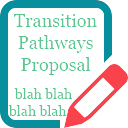 In February 2016, the Life Course Outcomes Research program at the AJ Drexel Autism Institute announced the receipt of a $3.5 million gift to launch a 5-year Transition Pathways Initiative at Drexel.
In February 2016, the Life Course Outcomes Research program at the AJ Drexel Autism Institute announced the receipt of a $3.5 million gift to launch a 5-year Transition Pathways Initiative at Drexel.
Develop a proposal
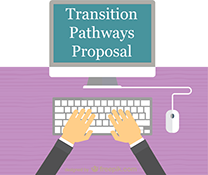 A foundation invited Drexel to submit a proposal to serve young adults. We quickly established goals related to employment, continuing education, community engagement, and independent living.
A foundation invited Drexel to submit a proposal to serve young adults. We quickly established goals related to employment, continuing education, community engagement, and independent living.
Define core components
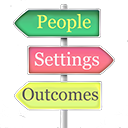 To begin to outline a potential program that involves the delivery of services, we sought to establish several guideposts. These were adjusted over a period of several months as we considered advantages and disadvantages of each option.
To begin to outline a potential program that involves the delivery of services, we sought to establish several guideposts. These were adjusted over a period of several months as we considered advantages and disadvantages of each option.
Build on models and partnerships
 Once we set our guideposts, we begin to consider how we might build on existing models for providing services, and how we might partner with existing programs already providing services in Philadelphia and beyond.
Once we set our guideposts, we begin to consider how we might build on existing models for providing services, and how we might partner with existing programs already providing services in Philadelphia and beyond.
Create a foundation for collective impact
 The principles of collective impact - common agenda, continuous communication, mutually reinforcing actions, shared measurement, and a common backbone - were a natural fit given the project's structure and goals.
The principles of collective impact - common agenda, continuous communication, mutually reinforcing actions, shared measurement, and a common backbone - were a natural fit given the project's structure and goals.
Invest in program development
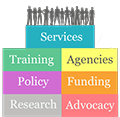 I framed the primary mission of the gift-funded backbone as program development, to support the time, planning, and staffing needed during the development, launch, and expansion phases for a university-community partnership.
I framed the primary mission of the gift-funded backbone as program development, to support the time, planning, and staffing needed during the development, launch, and expansion phases for a university-community partnership.
Create a program incubator
 This proposal defined a new approach to program incubation: identify an emerging need in a community-based partner; create a backbone to develop and implement a plan, and then transition management back to the partner.
This proposal defined a new approach to program incubation: identify an emerging need in a community-based partner; create a backbone to develop and implement a plan, and then transition management back to the partner.
Phase in replication and sustainability
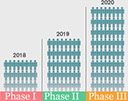 Launching a complex program in phases maintains your focus on specific goals, demonstrates replicability and sustainability, and documents progress for funders who may be considering whether to renew their investment.
Launching a complex program in phases maintains your focus on specific goals, demonstrates replicability and sustainability, and documents progress for funders who may be considering whether to renew their investment.
Braid funding and resources
 Novice leaders mistakenly assume there is a lot of untapped funding. Weave funding, staffing, and training across all of your partner agencies to control costs, ensure sustainability, and strengthen your coalition.
Novice leaders mistakenly assume there is a lot of untapped funding. Weave funding, staffing, and training across all of your partner agencies to control costs, ensure sustainability, and strengthen your coalition.
Evolving conversations with donors
 A philanthropic request developed through evolving conversations with donors is completely different from a research grant. Conversations about outcomes with a donor and partners pivoted on exploiting opportunities and overcoming obstacles that people face each day.
A philanthropic request developed through evolving conversations with donors is completely different from a research grant. Conversations about outcomes with a donor and partners pivoted on exploiting opportunities and overcoming obstacles that people face each day.
Scholarship through services
 Traditional research centers underestimate how hard AND how important it is to deliver services well. And engaging community providers as equal partners can feel awkward. But this opens a new door to scholarship through implementation.
Traditional research centers underestimate how hard AND how important it is to deliver services well. And engaging community providers as equal partners can feel awkward. But this opens a new door to scholarship through implementation.
Space: The Final Frontier
 How would we support shared work? Offer sanctuary? Which environments might invite other students, and others from the neighborhood? Can we imagine a co-working space to promote collaboration amongst our partner agencies?
How would we support shared work? Offer sanctuary? Which environments might invite other students, and others from the neighborhood? Can we imagine a co-working space to promote collaboration amongst our partner agencies?
Coming soon
